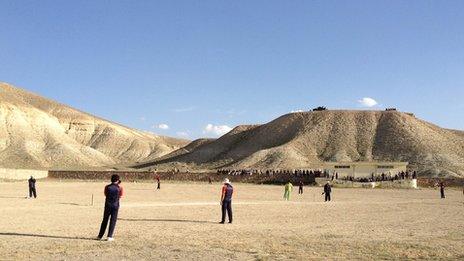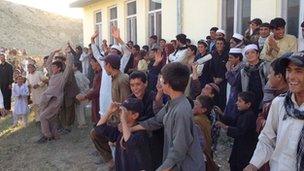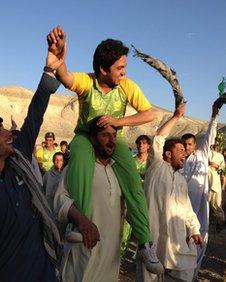Afghan divisions hit for six in cricket tournament
- Published

Mountainous Khake Jabar district is an unlikely cricketing venue
British historian GM Trevelyan once famously remarked that one of the reasons cricket became so popular in England was because "village cricket spread fast throughout the land".
In 21st Century Afghanistan it could be that locally organised cricket matches could also be spreading fast - and having a big impact.
Such games are in fact central to a new hearts-and-minds campaign to unite eight rival villages - divided by ethnic, tribal or clan differences - in the district of Khake Jabar, 45km (22 miles) south-east of Kabul.
The 15-over finals were recently held in the grounds of a primary school surrounded by barren hills which was one of the main fighting areas in Britain's second Afghan war from 1878 to 1880.
'Hangover'
"We have walked 25km to watch this match," says Hamid, 11, who has come to cheer for his village.

The cricket matches have helped erase long-standing divisions
Hamid says this is not only the first time he has stepped out of his village, but also the first time he has met and made friends with boys of his age from other villages of Khake Jabar.
This mountainous district was caught between the warring Northern Alliance forces and the Taliban in the late 1990s.
While some villages offered shelter to Alliance forces, others sided with the Taliban, creating wide divisions between the people.
"This is the gulf we are trying to bridge," says Ahmad Jan Ahmadzai, the district's education director and one of the organisers of the tournament.
"The youngsters of Khake Jabar were suffering from a hangover left by our elders. But now they are bonding again."
Mr Ahmadzai says that the growing Afghan love for cricket has done what repeated government attempts have failed to do - give the country a sense of unity and shared national pride.
'Boom-Boom Bilal'
Khan Mohammad, a member of the district's youth council, says they hit upon the idea of organising a local tournament after seeing the hysteria surrounding the national team's 2009 World Cup qualifier.

The winning side joyfully celebrated as the sun set
"Cricket brought Afghanistan together," Mohammad says. "For once, people brushed aside their ethnic and tribal loyalties to support the national team. Even the Taliban prayed for the team's success.
"But as the fever receded, divisions began to re-emerge," he says while heading towards the modest commentary box on the edge of the ground.
"We are trying to keep this fever alive."
The effort seems to be paying off.
Although the final was between the village of Chinar and the district police chief's team, people from all eight villages came to cheer them along.
"I am here for my favourite player from Chinar team," says 15-year-old Osman. "We call him the Kevin Pietersen of Afghanistan."
"We even have Boom-Boom Bilal," says Osman, referring to a young, rising cricketer known for his hard-hitting sixes.
Many of the cricketers fell in love with the game when they and their families took refuge in Pakistan to escape the Russian invasion, the civil war and the Taliban.
After the Taliban's fall, these people returned to their homeland, bringing their newly-acquired love with them.
Khake Jabar police chief Ahmed Jan Ghorzang is the captain of his team. He says he is not here to win the match but hearts and minds.
'Peculiarly Afghan'
"I want people to come closer to the police. There is distance between us and them. I am hoping cricket will fill this void," he says just before stepping on the pitch as his team's opener.
As the match begins, several local traders use the microphone in the commentary box to announce cash rewards.
"I will pay $100 for each six and $50 for a four," one trader announced. Another trader soon bettered the offer. "I will offer $150 for each six," he said.
Spectators roar and clap at every ball. But a few balls later, the match is halted. There is a dispute.
Supporters of Chinar point out that the police chief has included some provincial players into his team, a rules violation as teams are required to have players only from villages of the district.
Tribal elders are called in. They talk to the two sides and the dispute is resolved. Provincial players are allowed to play, but only after the police chief agrees to apologise.
It was a peculiarly Afghan way of resolving things.
The Chinar team scores 105 runs for the loss of eight wickets. But the police chief's team soon better the score, thanks to several hard-hitting boundaries from Boom Boom Bilal.
He is showered with praises and dollar bills at the end of the game.
"The tournament was a success," declares Haji Sher Shah, a local trader who sponsored the cricket gear and uniforms.
Mr Shah says tribal elders and traders like him have decided to pool their resources to sponsor more cricket matches in the coming days.
"Cricket will not only bring unity in this country, but will also keep the young generation away from drugs and violence," he says.
- Published3 March 2012
- Published18 September 2011